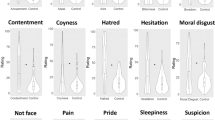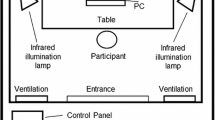Abstract
In this paper, we experimentally examined whether facial expression changes in teleoperated androids can affect and regulate operators’ emotion, based on the facial feedback theory of emotion and the body ownership transfer phenomena to teleoperated android robot. We created a conversational situation where participants felt anger and, during the conversation, the android’s facial expressions were automatically changed. We examined whether such changes affected the operator emotions. As a result, we found that when one can well operate the robot, the operator’s emotional states are affected by the android’s facial expression changes.
This work was supported by KAKENHI (20220002) and KAKENHI (24650114).
Access this chapter
Tax calculation will be finalised at checkout
Purchases are for personal use only
Preview
Unable to display preview. Download preview PDF.
Similar content being viewed by others
References
Botherel, V., Maffiolo, V.: Regulation of emotional attitudes for a better interaction: field study in call centres. In: Proc. 20th International Symposium of Human Factors in Telecommunication (March 2006)
Botvinick, M.: Rubber hands ’feel’ touch that eyes see. Nature 391(6669), 756 (1998)
Gross, J.J.: Emotion regulation: Affective, cognitive, and social consequences. Psychophysiology 39, 281–291 (2002)
Hatfield, E., Cacioppo, J.T., Rapson, R.L.: Emotional contagion. Current Directions in Psychological Science 2(3), 96–99 (1993)
Kleinke, C., Peterson, T., Rutledge, T.: Effects of self-generated facial expressions on mood. Journal of Personality and Social Psychology 74, 272–279 (1998)
MacIntosh, D.: Facial feedbck hypotheses: Evidence, implications, and directions. Motivation and Emotion 20, 121–147 (1996)
Nakanishi, H.: Freewalk: A social interaction platform for group behaviour in a virtual space. International Journal of Human-Computer Studies 60(4), 421–454 (2004)
Nishio, S., Ishiguro, H., Hagita, N.: Geminoid: Teleoperated android of an existing person. In: de Pina Filho, A.C. (ed.) Humanoid Robots: New Developments, pp. 343–352. I-Tech Education and Publishing, Vienna (2007)
Nishio, S., Watanabe, T., Ogawa, K., Ishiguro, H.: Body Ownership Transfer to Teleoperated Android Robot. In: Ge, S.S., Khatib, O., Cabibihan, J.-J., Simmons, R., Williams, M.-A. (eds.) ICSR 2012. LNCS (LNAI), vol. 7621, pp. 398–407. Springer, Heidelberg (2012)
Ogawa, T., Monchi, R., Kikuya, M., Suzuki, N.: Development of the general affect scales. The Japanese Journal of Psychology 71(3), 241–246 (2000) (in Japanese)
Soussignan, R.: Duchenne smile, emotional experience, and autonomic reactivity: A test of the facial feedback hypothesis. Emotion 2, 52–74 (2002)
Strack, F., Martin, L., Stepper, S.: Inhibiting and facilitating conditions of the human smile: a nonobtrusive test of the facial feedback hypothesis. Journal of personality and social psychology 54, 768–777 (1988)
Zeng, Z., Pantic, M., Roisman, G.I., Huang, T.S.: A survey of affect recognition methods: audio, visual and spontaneous expressions. In: Proc. 9th International Conference on Multimodal Interfaces, pp. 126–133 (2007)
Author information
Authors and Affiliations
Editor information
Editors and Affiliations
Rights and permissions
Copyright information
© 2012 Springer-Verlag Berlin Heidelberg
About this paper
Cite this paper
Nishio, S., Taura, K., Ishiguro, H. (2012). Regulating Emotion by Facial Feedback from Teleoperated Android Robot. In: Ge, S.S., Khatib, O., Cabibihan, JJ., Simmons, R., Williams, MA. (eds) Social Robotics. ICSR 2012. Lecture Notes in Computer Science(), vol 7621. Springer, Berlin, Heidelberg. https://doi.org/10.1007/978-3-642-34103-8_39
Download citation
DOI: https://doi.org/10.1007/978-3-642-34103-8_39
Publisher Name: Springer, Berlin, Heidelberg
Print ISBN: 978-3-642-34102-1
Online ISBN: 978-3-642-34103-8
eBook Packages: Computer ScienceComputer Science (R0)




